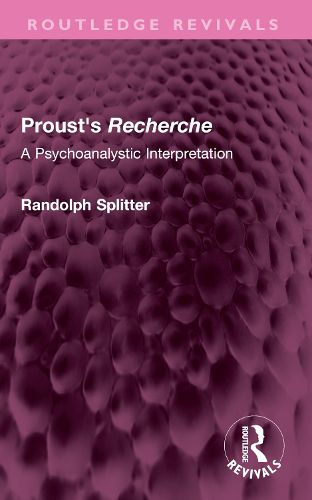Readings Newsletter
Become a Readings Member to make your shopping experience even easier.
Sign in or sign up for free!
You’re not far away from qualifying for FREE standard shipping within Australia
You’ve qualified for FREE standard shipping within Australia
The cart is loading…






Originally published in 1981 and now reissued with a new preface by Randolph Splitter, this volume examines Proust's novel A la recherche du temps perdu from a psychoanalytic viewpoint, showing that Marcel, the central character, like the novel itself, is characterized by an unstable equilibrium of opposing forces, so that he wishes both to dissolve the boundaries between inner and outer worlds, and to maintain divisions and defenses. Instead of trying to force the text into a rigid theoretical structure this reading of Proust's novel illuminates it by confronting and re-examining the problems that Freudian theory itself addresses. In considering these problems, the author also takes into account the findings of modern French psychoanalysis and literary criticism, referring particularly to the work of Jacques Lacan and Jacques Derrida.
$9.00 standard shipping within Australia
FREE standard shipping within Australia for orders over $100.00
Express & International shipping calculated at checkout
Originally published in 1981 and now reissued with a new preface by Randolph Splitter, this volume examines Proust's novel A la recherche du temps perdu from a psychoanalytic viewpoint, showing that Marcel, the central character, like the novel itself, is characterized by an unstable equilibrium of opposing forces, so that he wishes both to dissolve the boundaries between inner and outer worlds, and to maintain divisions and defenses. Instead of trying to force the text into a rigid theoretical structure this reading of Proust's novel illuminates it by confronting and re-examining the problems that Freudian theory itself addresses. In considering these problems, the author also takes into account the findings of modern French psychoanalysis and literary criticism, referring particularly to the work of Jacques Lacan and Jacques Derrida.